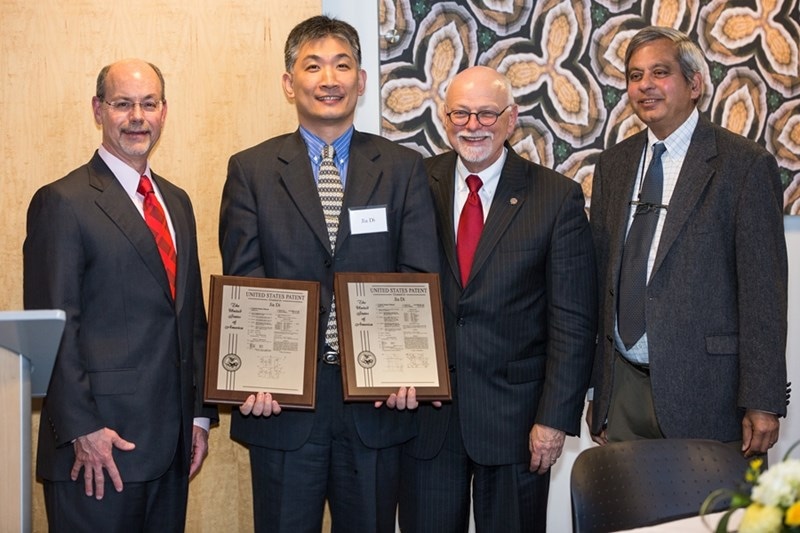Sep 2 2016
 Jia Di, professor of computer science and computer engineering, is congratulated at this spring's Inventors' Appreciation Banquet by University of Arkansas System President Donald R. Bobbitt (from left), U of A Chancellor Joe Steinmetz and U of A Provost Ashok Saxena. (Credit: University of Arkansas)
Jia Di, professor of computer science and computer engineering, is congratulated at this spring's Inventors' Appreciation Banquet by University of Arkansas System President Donald R. Bobbitt (from left), U of A Chancellor Joe Steinmetz and U of A Provost Ashok Saxena. (Credit: University of Arkansas)
Jia Di, computer engineering professor from the University of Arkansas, was awarded a $349,198 by the National Science Foundation in order to improve his design of microcontrollers that can work in harsh environmental conditions, such as space.
This technology has many uses in satellites and space vehicles, and several other commercial applications, such as monitoring and drilling wells in gas and oil exploration, sensing and control in automobile engines, energy-storage systems, computing, lasers, and medical imaging.
The NSF has presented the award as part of its Grant Opportunities for Academic Liaison with Industry program. Di will collaborate with Radiance Technologies Inc., a Huntsville, Alabama, systems-engineering and technology firm, to enhance his work on asynchronous microcontrollers that depend on local “handshaking” protocols instead of the standard timing protocols that depend on international clocks.
Electronic system circuits are currently time based, and the transfer of data takes place within a particular timeframe. These standard time-based systems can be affected by the extremely high or low temperatures, leading to malfunctioning in rough environments.
The design of digitally integrated circuits developed by Di rely on asynchronous logic in order to enhance the performance of chips. Handshaking protocols are used by all parts of the circuit.
These protocols are the communication mechanism between two adjoining circuit components that inform each other about their operation status. The completion of one task and the beginning of the next task are indicated by these protocols.
The researchers will use this approach to design, construct, and test a prototype microcontroller that they plan to market. Their main aim is to obtain a powerful system operation with low-power consumption, which preserves battery and harvested energy.
Di holds the 21st Century Research Leadership Chair in the College of Engineering at the University of Arkansas.